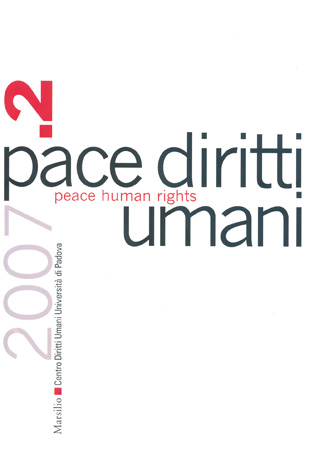Collections

Riflessione preliminare a un progetto di fattibilità per l’istituzione del Corpo Civile di Pace (Servizio civile di pace) in Italia. Il primato dei diritti umani, della nonviolenza e della politica per la prevenzione e la risoluzione dei conflitti
- Contained in
- Pace diritti umani - Peace Human Rights, 2/2007
- Pubblication type
- Articolo / Saggio
- Pages
- 83-98
- Language
- IT
Preliminary Reflexions on a Feasibility Project for the Establishment of a Civil Peace Corps (Peace Civil Service) in Italy. The Primacy of Human Rights, Nonviolence and of Politics for Conflict Prevention and Resolution
Antonio Papisca*
On 26 August 2006 the «Peace Table» and the «Italian Network of Local Authorities for Peace and Human Rights» convened in Assisi an extraordinary meeting of civil society organisations and movements.
The event addressed the case of the UN intervention in Lebanon and focussed on the role of the Italian government. The Vice Minister of Foreign Affairs, Patrizia Sentinelli, partricipated in the meeting. The author of the present essay was invited to offer a key-note speech. He highlighted the full legitimacy on that military intervention, based on a Security Council resolution and organised under the flag and the authority-command of the United Nations. He seized the opportunity of the meeting to emphasize the necessity to fully comply with the present legality the core paradigm of which is provided by the UN Charter and the Universal Declaration of Human Rights. The UN approach to peace and security is now under the cover of «human security» that means «people security» and is multidimensional, then including also social, political and economic dimensions. States no longer own the ius ad bellum, the right to make war. The use of military resources, when and where necessary for purposes that cannot be for war, should be carried on under strict political supervision within the UN system and, in case, within regional systems acting in accordance with the provisions of Chapter VIII of the UN Charter. We are facing the nightmare of the easy war produced by an extensive interpretation of Article 51 of the UN Charter and by the will of the superpower (and of other states behind it) to rescue the very right to make even preventive war. Also to counter this barbarian drift, time has come to give way to an old idea nurtured within the European Parliament since 1995 referring to the creation of a «European Civil Peace Corps». In this matter a formal resolution was endorsed by the European Parliament in 2001 and a feasibility study was produced in 2005 upon request of the European Commission. The philosophy of the would-be European White Helmets would be different from that stemming from the ongoing experience on «White Helmets» in Latin America. In our case, it should be distinguished development cooperation and traditional humanitarian aid on one side, and «peace service» or «peace work» on the other. As a matter of principle, a further distinction should be made between the «civil component» of peace (military) missions and the «civil peace corps»: the latter should be conceived and deployed as an autonomous body of civil society. For both cases, it is necessary that a strong «political authority» supervises the operations. The author addresses also some practical aspects, like for instance the formal status (and the guarantees) of those who «work» in the civil peace corps.
* The present essay was formally requested by the Vice Minister of Foreign Affairs on 20 February 2007. It was presented in Rome, at the Ministry of Foreign Affairs, during an ad hoc meeting on 27 June 2007, with the active participation of many Italian NGOs.

